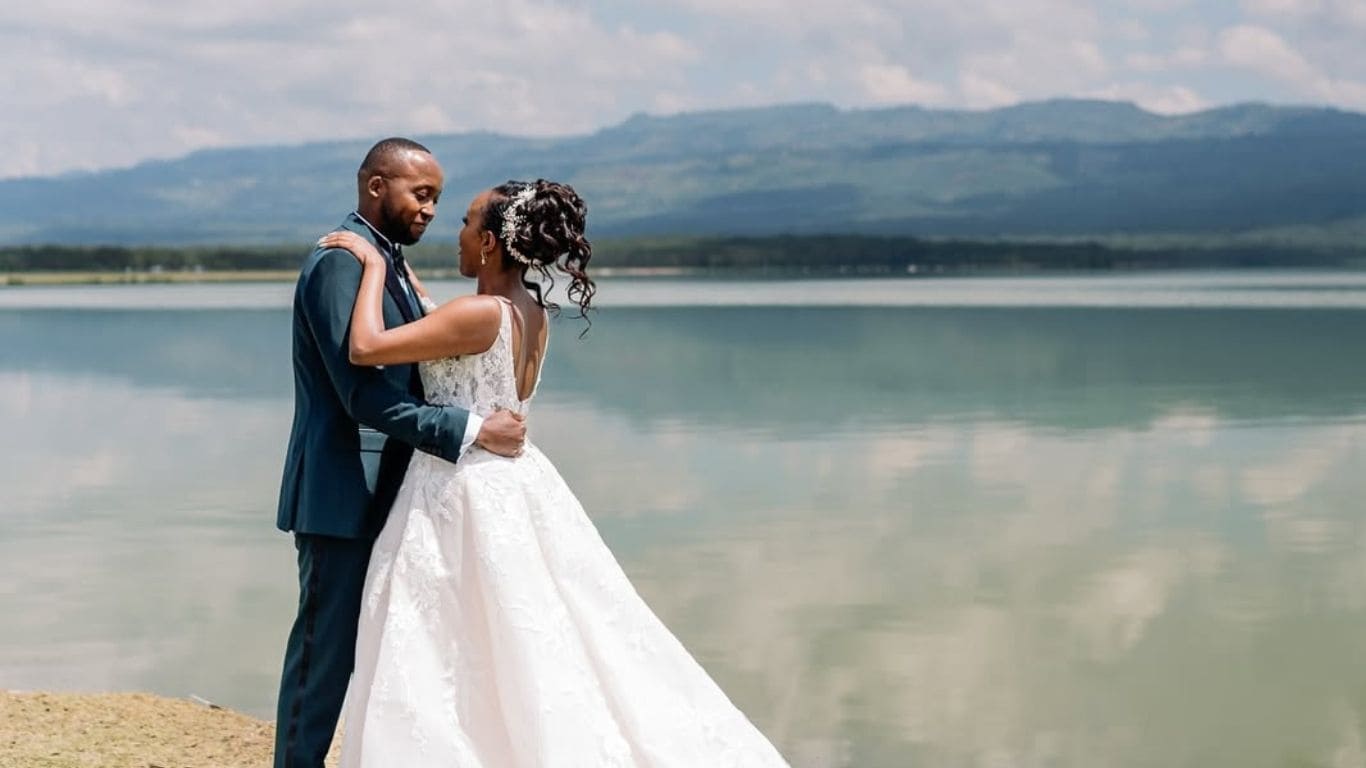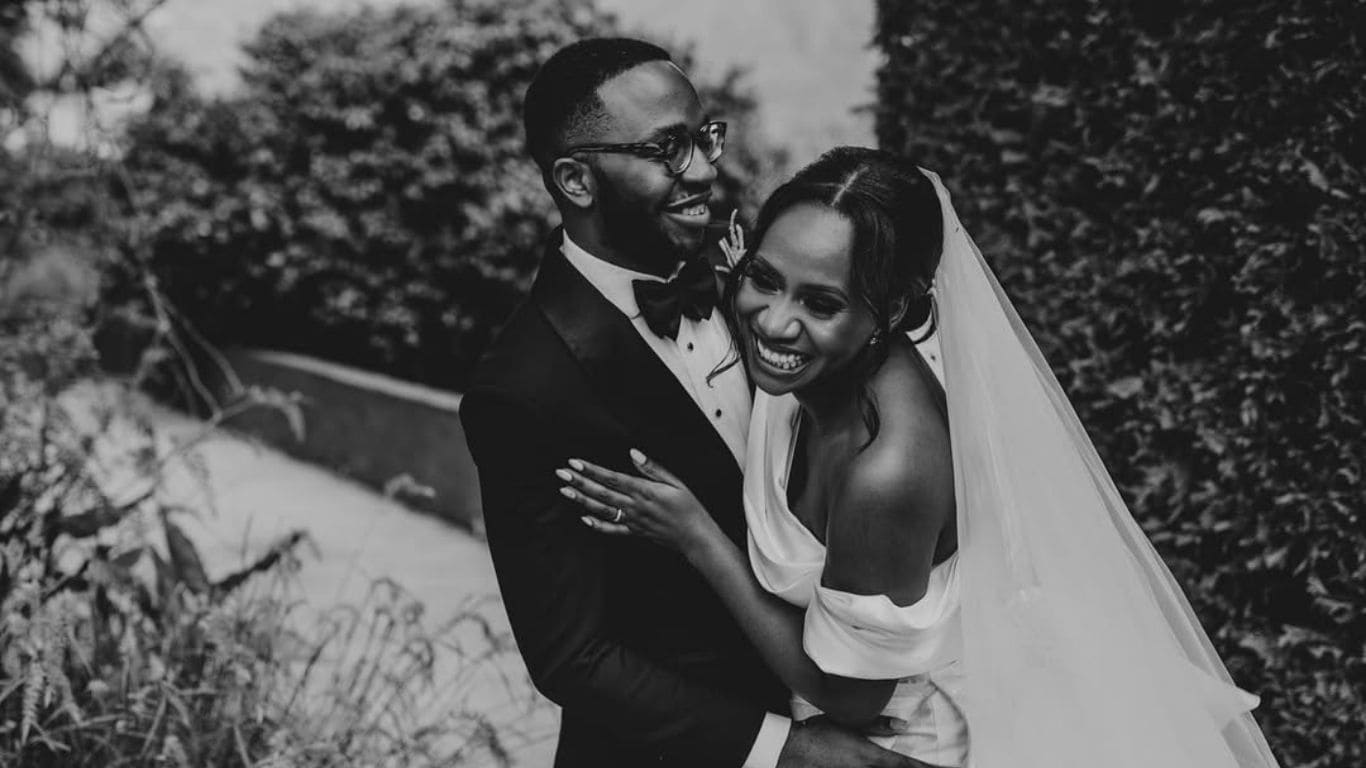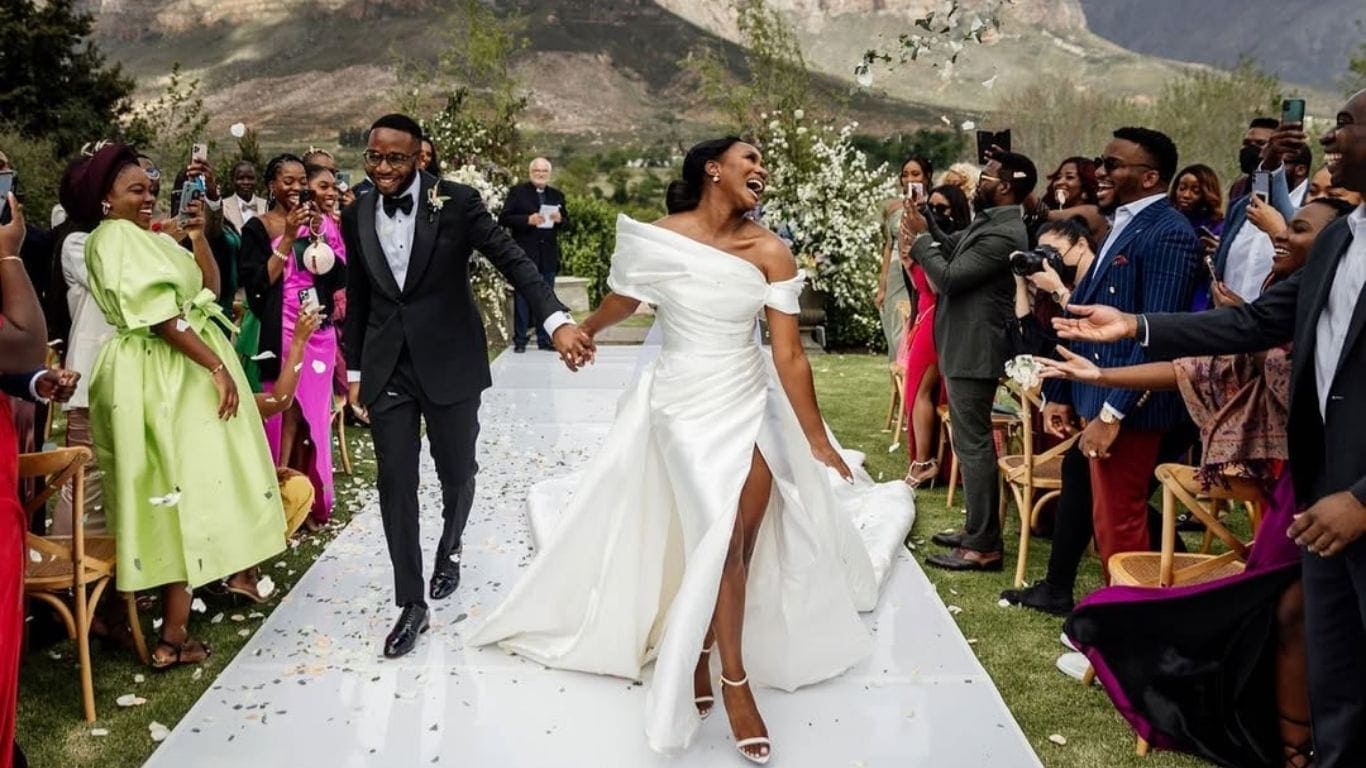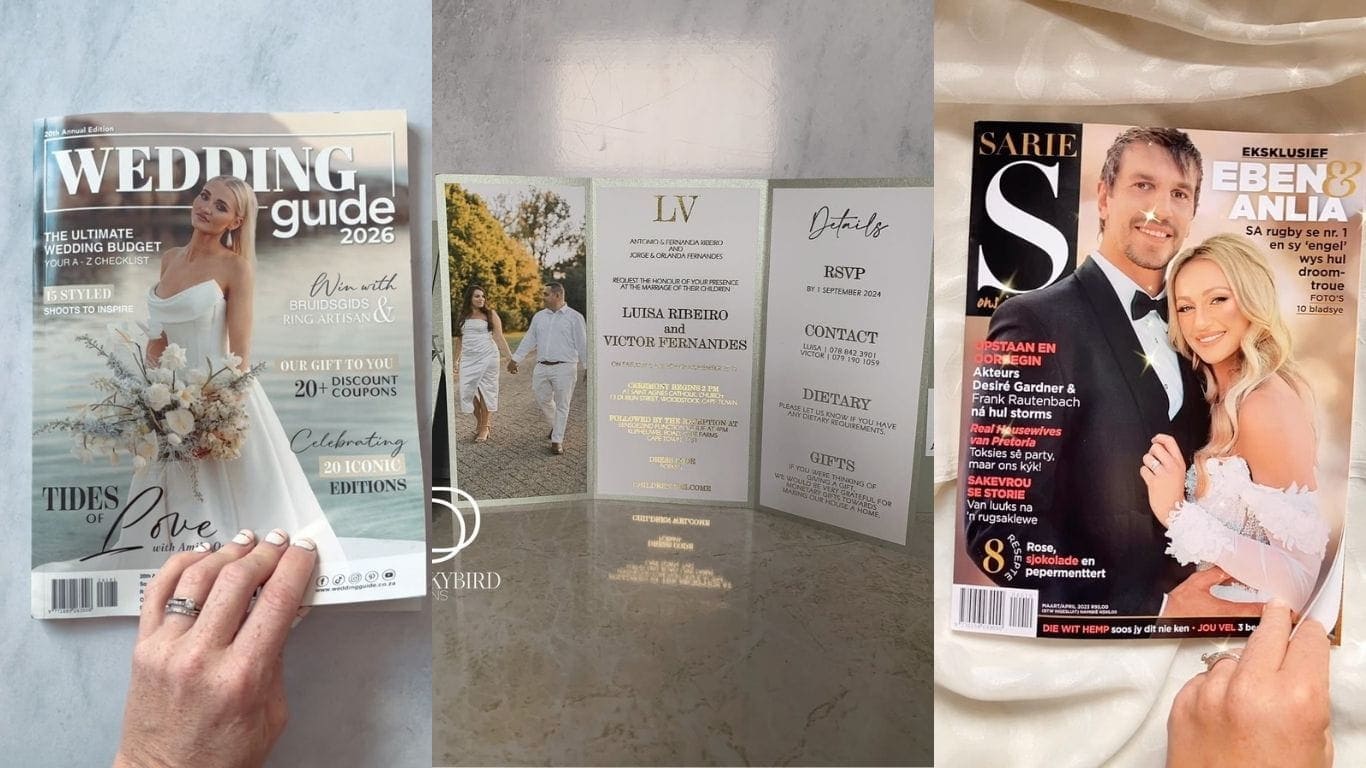Curious about who pays for a Kenyan wedding? Here’s everything you need to know about the contributions of the bride, groom, and their families.
Kenyan weddings are more than just ceremonies. Family reunions, cultural showcases, and personal milestones are rolled into one. Whether it’s a vibrant traditional gathering in Kisumu or a modern white wedding in Nairobi, there’s a shared thread of love celebrated through community and culture.
But here’s the thing: weddings in Kenya, like in many parts of Africa, can come with a hefty price tag. What’s considered a simple event to one family might look extravagant to another. For some, the dream of a luxurious garden wedding feels worth every shilling. For others, a modest ceremony surrounded by loved ones means just as much.
That’s why it’s important to talk about who actually pays for what. Understanding how wedding expenses are typically handled and how families approach them differently helps couples plan better, avoid awkward assumptions, and start their marriage on the right note.
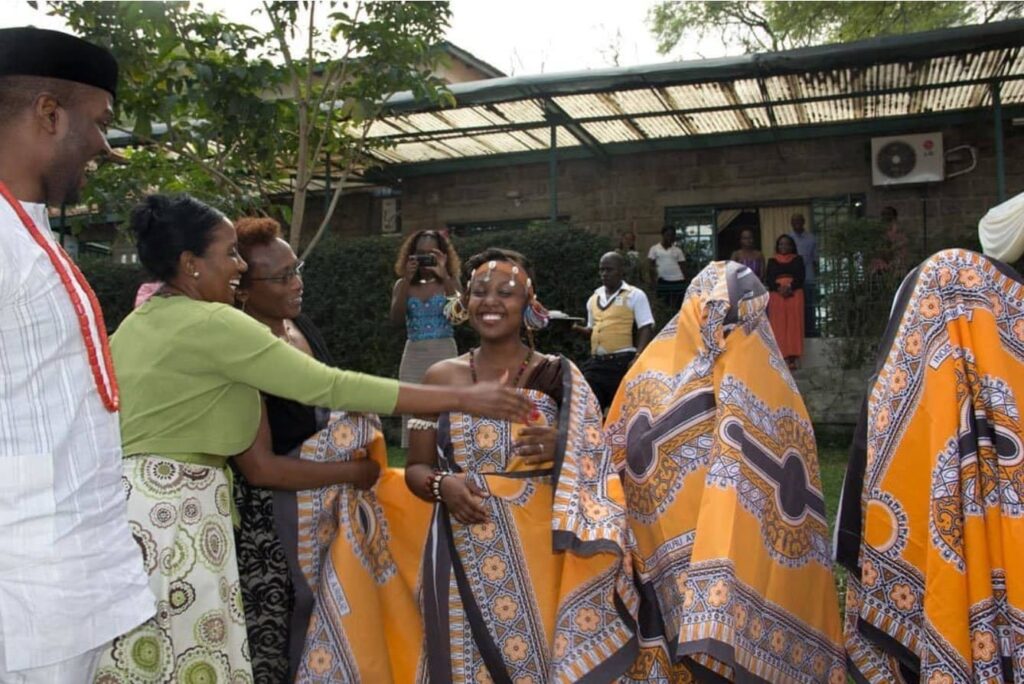
What Are Marriages in Kenya Like?
Marriage in Kenya is as diverse as the people themselves. Traditions vary across ethnic groups, religions, and regions, but one thing remains constant: marriage is rarely seen as a union between two individuals alone. It’s a joining of families, histories, and expectations.
For couples who are both Kenyan, weddings often blend traditional and modern influences. You might see a colorful ruracio (dowry ceremony) followed by a white wedding in church, each carrying equal weight and meaning. Families play an active role, from planning and funding to deciding which traditions must be observed. These weddings often stretch over days, filled with music, food, laughter, and symbolism.
For Kenyan-foreigner couples, things can look a little different. While some families insist on following customary rites like bride price negotiations, others adapt or simplify traditions to accommodate the partner’s culture. Costs and responsibilities also shift; instead of extended family involvement, the couple might fund most of the celebration themselves. Still, even in cross-cultural marriages, respect for Kenyan customs remains a central part of the process.
Whether held in Nairobi, Mombasa, or abroad, a Kenyan wedding carries one unmistakable quality: it’s never just about the event. It’s about family identity, pride, and continuity.
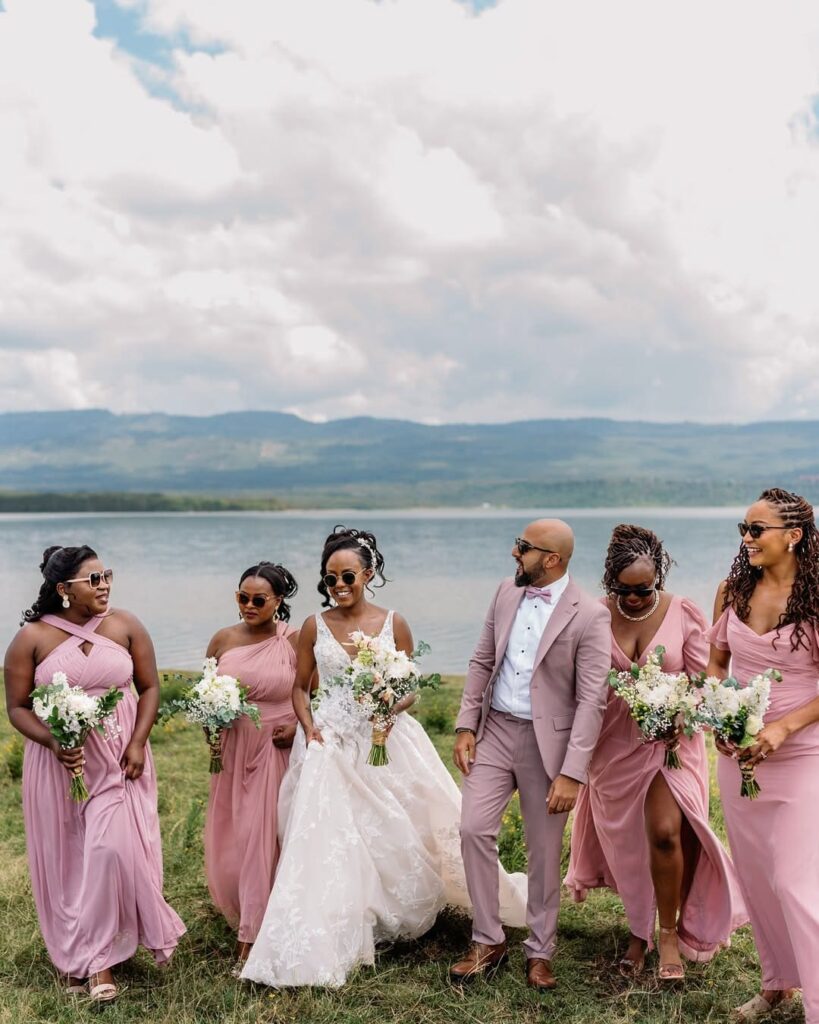
Image Source: Instagram/@cikunyawira
How Much Does a Wedding Cost in Kenya?
If there’s one thing everyone agrees on, it’s that weddings in Kenya aren’t cheap, at least not when you want them done well. The cost depends heavily on the kind of ceremony, the number of guests, the location, and how much families or couples are willing (or able) to spend. Let’s break it down using a mix of research, surveys, and Janatribe‘s on-the-ground insights from wedding planners and couples themselves.
A Samantha Bridals survey, cited by both Africa Business Insider and Janeson in 2023 and 2024, estimated the average cost of a Kenyan wedding between KSh 2.5 million ($17,000) and $34,000, with many couples trying to stay below KSh 1.5 million ($14,900). That figure covers the full experience—venue, décor, catering, entertainment, photography, attire, and logistics. It shows how big the gap can be between modest and luxury celebrations.
At the lower end of the scale, a civil wedding at the Registrar’s office costs about KSh 4,700 ($42), while a church wedding ranges from KSh 12,000 to 14,000 ($105–123), depending on denomination, per a Redditor. These fees cover only the legal and religious formalities: the officiant, counseling, and marriage certificate. No reception, no décor, no catering—just the paperwork and vows.
Once you add a reception, catering, music, and photography, even a modest wedding can climb fast. According to Wedding Services Kenya, a 200-guest wedding typically costs between KSh 1 million and KSh 2 million. That range reflects what most middle-income couples spend—comfortable but not extravagant.
Different styles of weddings also come with their own price brackets. Elisa Events, a Nairobi-based planning firm, gives these estimates:
- Traditional weddings: Between KSh 400,000 and KSh 1 million, depending on cultural rites, gifts, and guest size.
- Garden weddings: Around KSh 500,000 to KSh 1.5 million, with décor and venue rental being major expenses.
- Church and reception weddings: Anywhere from KSh 600,000 to KSh 2 million, largely shaped by catering and entertainment.
- Destination weddings: At the coast or high-end resorts, costs rise to KSh 2 million–5 million, especially when accommodation and travel are included.
Event planners like Billions Events put the national average at KSh 500,000 to KSh 3 million, which lines up with most urban weddings that strike a balance between tradition and modern luxury.
Then there’s the premium category—destination weddings designed for locals and foreigners. Diwas Weddings estimates a three-day destination celebration in Kenya can cost $60,000 to $70,000 for around 100 guests. This includes accommodation, meals, décor, entertainment, makeup, photography, and coordination. A local makeup artist might charge $700–1,000 for three events, while photographers and videographers charge $1,200–1,800 for a 12-hour shoot. Entertainment for multiple events ranges between $4,000 and $6,000, and décor for three to four functions can reach $12,000–14,000.
All this shows how flexible Kenyan weddings can be. You can legally marry for under KSh 5,000 or spend the equivalent of a new car on a luxury destination ceremony. What matters is clarity, knowing your priorities, understanding who’s contributing, and planning within what feels right for both families.
Who Pays for the Wedding in Kenya?
Money conversations can get delicate when it comes to weddings in Kenya. They touch on tradition, pride, and practicality all at once. While customs vary across ethnic groups and religions, there’s still a shared understanding of how costs are typically divided, even if modern couples are rewriting the rules.
Traditionally, the groom and his family shoulder most of the expenses. In many Kenyan cultures, it’s the man’s responsibility to prove readiness for marriage by financing both the bride price (dowry) and much of the wedding itself. This includes the main ceremony, food, venue, entertainment, and sometimes even attire for the bridal party. It’s not just about money, it’s about showing respect and capability.
The bride and her family, on the other hand, often focus on hosting and hospitality. They might cover pre-wedding events like the ruracio (dowry ceremony) or contribute to decorations, outfits, or catering. In some families, the bride’s parents handle certain symbolic parts of the celebration, things like the cake, photography, or a specific meal for guests, as a gesture of goodwill and partnership.
In urban and modern settings, though, this dynamic is changing fast. Many couples now split costs evenly or pay for everything themselves, especially if they already live independently or are working abroad. These couples often prefer to plan their wedding as a joint project rather than a family-funded event. For Kenyan–foreigner marriages, that’s even more common, since the foreign partner’s family might not be familiar with local traditions or cost expectations.
That said, families still play a big role — emotionally and financially. Even when the couple is paying for most of it, parents may step in to cover parts of the budget, sometimes unprompted. In Kenyan culture, a wedding is rarely seen as “just the couple’s event.” It’s a family statement, and families often want their fingerprints on it.
At its core, who pays for a Kenyan wedding depends on three things: tradition, relationship dynamics, and finances. Some couples blend the old and new — the groom’s family might handle traditional rites, while the couple funds the white wedding. Others work with what makes sense, dividing expenses based on ability rather than gender or expectation.
The key is communication. When both sides are honest about what they can afford, it sets a tone of transparency and respect that carries well beyond the wedding day.
Traditional Weddings in Kenya
The first cost in a traditional Kenyan wedding is the bride price, or dowry. It’s more than a financial transaction — it’s a symbolic gesture showing that the man is capable of caring for a family and a sign of gratitude to the bride’s parents for raising her well.
Dowry in Kenyan Culture
Dowry, or bride price, remains deeply rooted in most Kenyan communities, especially under customary and Islamic law. While practices differ, the meaning is largely the same: it marks respect, commitment, and legitimacy.
In many regions, dowry isn’t just an expectation — it can become a legal obligation. Under Kenyan law, a “promise of dowry” is considered a binding contract. If a groom agrees to pay and later fails to do so, the bride or her family can claim it in court, even after a divorce.
But this is not a conversation between lovers. Dowry is discussed strictly among elders — men from both families — often during a formal introduction ceremony. These elders represent their families in negotiations, using humor, diplomacy, and respect to agree on what the payment should be.
In Luo culture, the process begins with ayie, a small payment made to the bride’s mother as a sign of acceptance. It’s like saying, “we agree to this union.” The groom’s side may bring gifts — fabric, blankets, food, even shoes — before the main dowry payment, called nyombo, is settled. Traditionally, dowry was paid in cattle. A father-in-law would visit his daughter’s new home, throw his arungu (a club) into a grazing herd, and every cow between him and where the club landed became his. Over time, this turned into negotiated payments of twenty or more cows, often delivered in stages.
Among the Kikuyu, the dowry process is called ruracio. It involves a series of symbolic payments, from a token acknowledgment called kumenya mucii (to know the home) to the main dowry agreed upon by both families. For the Kamba, it’s known as mbui sya ntheo — a ritual involving the offering of goats and gifts to confirm the union. The Luhya may exchange cattle, goats, and cash, while the Kalenjin emphasize both livestock and beer as part of the ceremony. Among coastal Swahili Muslims, dowry (known as mahr) is guided by Islamic law, where the amount is agreed upon and given directly to the bride herself rather than her parents.
While the cultural meaning of dowry remains strong, modern realities have complicated it. In urban areas, it’s often paid in cash instead of livestock, and families may accept symbolic amounts rather than traditional herds. Some couples even split the payment, acknowledging both culture and practicality.
Still, dowry can create tension. A Reddit user who married a Kenyan woman shared how dowry negotiations can range between $5,000 and $10,000, depending on the woman’s education, background, and the family’s expectations. Others described negotiating respectfully with in-laws over time rather than paying it all at once. Even today, stories abound of dowry talks turning into heated debates, proof that what started as a cultural gesture can easily slide into financial strain if handled poorly.
Beyond the economics, though, there’s an ongoing debate about dowry’s place in modern Kenya. A 2023 paper by Alphonce Odhiambo Oduor, Dowry Payment in Kenya: Grounds for Abolition, argues that the practice has taken a troubling turn. He notes cases where women are pressured to fund their own dowries just to marry freely, or where some men treat paid dowry as ownership, violating women’s dignity and rights. The paper calls for dowry to be abolished and criminalized, framing it as a threat to women’s constitutional freedoms and autonomy.
So while dowry remains one of the most recognizable aspects of Kenyan marriage, it’s also one of the most contested, both culturally and legally.
Can a Dowry Be Refunded? What the Law Says
This question has sparked countless legal disputes in Kenya. When marriages fall apart, families sometimes demand that dowry be returned, a practice that exposes how traditional norms clash with modern law.
Under the Marriage Act of 2014, dowry payments are not explicitly required, and the Act doesn’t define what should happen to them after divorce. Instead, courts turn to customary law or Islamic law, depending on the type of marriage.
Under customary law, refunds depend heavily on the community and the circumstances. For instance, in some Mijikenda communities, if a marriage ends permanently, the bride’s family is expected to refund the dowry. The logic is that the marriage contract, having failed, should be reversed, including the payments made.
However, courts have been inconsistent. Some rulings hold that dowry should be refunded if the woman initiates divorce without cause, while others argue that once dowry is paid and cohabitation begins, it cannot be reclaimed. Judges often weigh cultural norms, fairness, and the unique facts of each case.
In Islamic marriages, dowry (mahr) is handled differently. It’s a personal gift to the bride, not her family, and once given, it belongs entirely to her. If a marriage ends, the husband cannot demand it back.
As Kenya modernizes, dowry continues to walk a fine line between heritage and human rights. For many, it’s a cherished tradition symbolizing respect and unity. For others, it’s a practice in need of reform, or even abolition.
Either way, no discussion about weddings in Kenya feels complete without it.
White Weddings in Kenya
In Kenya, white weddings are where culture meets modern celebration. They’ve become the grand moment, the day couples go all out to express love, faith, and style. From lavish garden ceremonies in Karen to beach receptions in Diani, these weddings are a mix of personal taste, family pride, and social display.
But when it comes to footing the bill, things have shifted. In earlier generations, most costs were handled by families, especially the bride’s side. These days, many Kenyan couples, particularly those in urban and middle-class circles, are taking charge of their own expenses. It’s common to see the bride and groom pooling resources, splitting costs, or covering everything together.
That said, the traditional expectations still linger in many families.
What does the bride’s family pay for?
Traditionally, the bride’s family handled most of the wedding expenses, from the engagement party to the getaway car.
According to etiquette experts like Christin Gomes and Ida Gibson, PhD, of Common Courtesy, these costs often included:
- The engagement party
- Wedding planner and coordination
- Invitations and day-of stationery
- Photography and videography
- Venue and décor
- Bride’s and bridesmaids’ attire (and all accessories, including the veil)
- Floral arrangements and rentals for ceremony and reception
- Food and drinks
- Wedding cake
- Transportation for guests
- Travel and lodging for bridesmaids and officiants
Even today, TheKnot notes that the biggest cost still traditionally covered by the bride’s parents is the wedding ceremony itself, venue, décor, and music included.
Friends sometimes step in too. Bridesmaids and the maid of honor might host the bridal shower and bachelorette party, while the best man and groomsmen handle the bachelor’s party. Some close friends even chip in for engagement parties or small pre-wedding events.
What does the groom’s family pay for?
Traditionally, the groom’s side had fewer financial obligations. They were responsible for:
- The marriage license and officiant’s fee
- Corsages and boutonnières for both families
- Lodging for groomsmen
- The rehearsal dinner
- Reception alcohol (optional)
- DJ or band (optional)
In the past, rehearsal dinners were small, usually limited to the wedding party. But as welcome parties have become a trend in Kenya, often involving all guests, the groom’s parents aren’t always expected to cover that full cost anymore.
What does the bride traditionally pay for?
Historically, the bride personally paid for:
- Her bouquet and her bridesmaids’ flowers
- Gifts for bridesmaids
- Hair and makeup
- Groom’s wedding band
- Groom’s gift
Many women today still handle these items, though it’s also common for couples to merge their wedding budgets completely, reflecting a partnership rather than two separate financial roles.
What does the groom traditionally pay for?
The groom’s financial responsibilities included:
- Engagement and wedding rings
- Marriage license and officiant’s fee (if not already paid by parents)
- Ceremony expenses (like the organist, soloist, and tips)
- Bride’s bouquet and bridesmaids’ flowers
- Groomsmen’s boutonnières and gifts
- Bride’s wedding gift
- Wedding night accommodation and honeymoon
Traditionally, the groom selected and paid for both the engagement and wedding rings, while the bride paid for his. Now, couples usually choose and pay for their rings together.
Overall, the Kenyan white wedding has become more about shared responsibility than rigid roles. Whether it’s a luxury Nairobi ballroom event or an intimate countryside garden affair, couples are approaching marriage with teamwork at the center, planning, budgeting, and celebrating as one.
Post-Wedding Trips and Honeymoon
After all the ceremonies and late-night dancing, most Kenyan couples take time to breathe, and that’s where the honeymoon comes in. It’s the one part of the wedding journey that almost always belongs entirely to the couple.
In many cases, the groom takes responsibility for the honeymoon, especially when the wedding itself was a shared expense. But it’s becoming common for both partners to plan and fund it together. Some couples see the honeymoon as their first joint project, a practical extension of the teamwork that got them through wedding planning.
Popular honeymoon destinations within Kenya include Diani Beach, Watamu, Naivasha, Nanyuki, and Maasai Mara, offering everything from luxury resorts to intimate nature lodges. Those with larger budgets might travel abroad to destinations like Zanzibar, South Africa, or Dubai. Costs vary widely, but even a short local getaway can feel special after the intensity of wedding preparations.
For couples who spent heavily on the wedding, the honeymoon is sometimes postponed, they opt for a mini-moon first, saving for a bigger trip later. Others choose to simplify the wedding itself and pour more into travel, seeing the honeymoon as the real celebration of their union.
Whatever form it takes, the honeymoon marks the start of a new rhythm, one defined not by families, planners, or guests, but by the couple themselves.
Final Thoughts
Weddings in Kenya often begin with the oldest tradition of all, the dowry. It’s more than a transaction; it’s a show of respect and readiness for marriage. Depending on tribe and circumstance, it can range from a few cows to several thousand dollars, marking the first major cost before any white dress or church ceremony comes into play.
From there, the spending grows fast. A modern Kenyan wedding can cost anywhere between KSh 500,000 and KSh 3 million, while lavish coastal or destination celebrations can soar past $60,000. Today’s couples are more involved in covering these costs, splitting expenses or shouldering them entirely. Yet whether it’s a modest garden event or a grand reception in Nairobi, every shilling spent reflects the same thing, love, family, and the merging of two worlds under both tradition and modern partnership.

